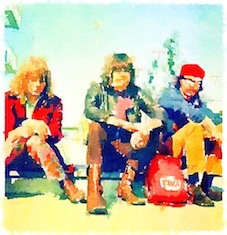
Key figures, along with Caravan and Hatfield and the North, in the Canterbury prog rock scene Soft Machine appropriated their name from William Burroughs' The Soft Machine. The band dates back to mid-1966 when the basic quartet (Daevid Allen, guitar, Kevin Ayers, bass, guitar and vocals, Mike Ratledge, organ and Robert Wyatt, drums and vocals) coalesced in Canterbury. American guitarist Larry Nowlin played the first couple of gigs as well. A 1963 combo had Allen and Wyatt along with future bassist Hugh Hopper in the Daevid Allen Trio with occasional appearances by Ratledge. Wyatt, Ayers and Hopper, with a couple of players who ended up in Caravan had been members of the Wilde Flowers. But while we talk about a Canterbury scene, much of the action occurred elsewhere. Soft Machine were substantial figures in the London Underground scene, playing the legendary UFO Club, Middle Earth and the Speakeasy. Impresario Giorgio Gomelsky booked them into gigs along the Côte d'Azur in July and August 1967 which in turn got them into Paris and onto French TV. They picked up significant avant-garde credibility when the ended up providing the musical accompaniment to a play by Picasso.
Heading back to England, the Australian Allen was refused re-entry, and that was it for the original lineup. Wyatt, Ayers and Ratledge continued as a trio, while Allen returned to Paris to form Gong. Soft Machine's subsequent fortunes were shaped by their management, who also looked after the Jimi Hendrix Experience. An American tour opening for the Experience provided the chance to cut their debut album in New York in April 1968. Back in Britain they briefly morphed back into a quartet, adding Andy Summers (later, The Police) on guitar before heading stateside for a string of dates with Hendrix (August–September 1968). Summers departed fairly quickly. Ayers seems to have decided they didn't need a guitarist. Before long he decided they didn't need him either and took off for the Baleares and a solo career.
Wyatt stayed in the US recording demos later released as '68. Ratledge headed back to London. Contractual obligations forced them back on the road in January 1969, with former road manager Hugh Hopper on bass. A second album, largely based around those Wyatt demos, pushed them towards an instrumental sound with occasional Wyatt warbles. That, in turn, produced Third, all instrumental apart from Wyatt's Moon in June. The Wyatt-less Fourth was the first of a series of instrumental affairs featuring noted British jazzers and the point where Hughesy's interest started to wane.
Wyatt, meantime, had headed off to form Matching Mole. Machine molle is French for soft machine. Subsequent Softs material saw a label switch to Harvest in 1975 and a steady stream of reissued repackagings of Wyatt era material, strong on the eccentricities and pataphysics, which was the material that interests the writer. The extensive notes in the discography, cribbed, predictably, from Wikipedia and the All Music Guide stem from the need to investigate that material and keep track of a sometimes bewildering profusion of product. Discography
Studio albums Live albums and compilations 1972-94 Live albums and compilations 1995-2002 Live albums and compilations 2003-2006 Live albums and compilations 2009-Present